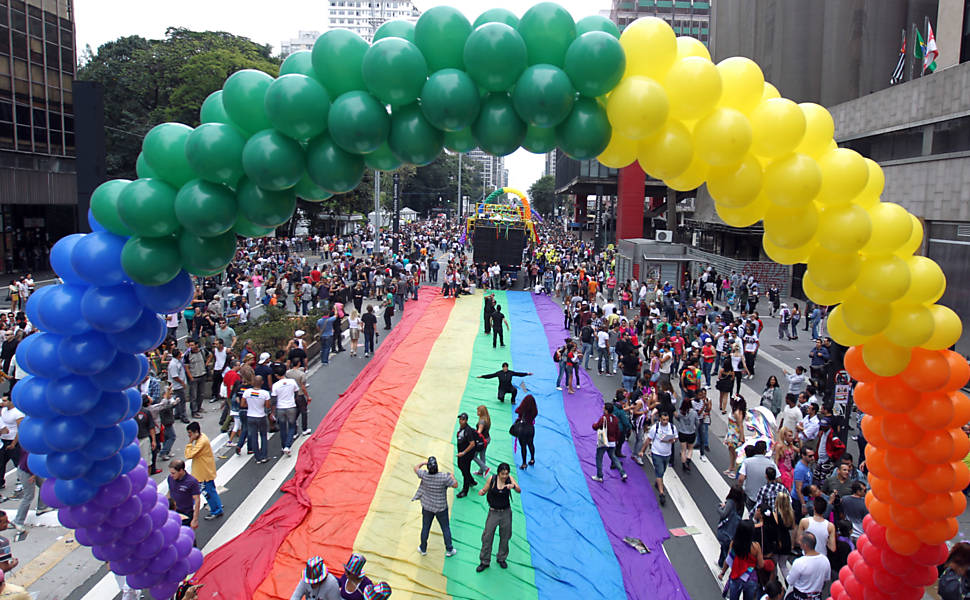 By Claire Rigby
By Claire Rigby
Is São Paulo the gayest city in South America?
Does size matter?
If so, then probably. At noon on Sunday, São Paulo’s Pride parade, the ‘Parada’ kicks off at the MASP museum on Avenida Paulista, 16 years after the first march gathered about 300 people and ended in uproar when the police tried to prevent it, with the outsized drag queen Kaká de Poli famously planting herself in the road, lying down and refusing to be moved.
This weekend, if recent years are anything to go by, hundreds of thousands of people will accompany the march along Paulista, the city’s iconic avenue, skirting the edges of the neighbourhood of Frei Caneca (‘Gay Caneca’) and on downtown to the parade’s end at Praça Roosevelt, where the crowd splinters, eventually, much of it towards the grittier gay stronghold of Largo do Arouche. (‘Millions’ of attendees is the figure annually claimed for the march, based on organizer estimates and the last year in which the Federal Police published its official figures – that was 2.5 million, in 2006.)
But whatever the turn-out, and even if it rains, this has been a huge year for gay rights in Brazil. There’s a sense in the air of battles being fought and won, and new fronts opened. Last year, Brazil’s Supreme Court ruled that the status of ‘união estável’, a form of civil union, must be extended equally to hetero- and homosexual couples.
This year, that historic decision is evolving into the right to marry – unevenly, and bumpily, but apparently inexorably, despite powerful opposition from conservative and religious forces. In some parts of the country, couples are already tying the knot, including six lesbian couples inside Recife women’s prison on 24 May, in a ceremony that also married eight heterosexual couples.
Many judges, however, are still refusing to interpret the civil union ruling as implying the permissibility of same-sex marriage. In the city of Rio de Janeiro, judge Luiz Marques is rejecting all same-sex marriage applications as a matter of course on the grounds that by law, in his view, marriage is contracted between a man and a woman. Yet when Marques went on holiday in January, his stand-in promptly approved one application, highlighting the inadequacy of leaving the matter at the discretion of individual judges.
Sooner or later, the federal state will need to sort out the mess, and that looks likely to happen this year, with Senator Marta Suplicy’s project to enshrine in law the Supreme Court judgment in favor of same-sex civil union, and hence marriage.
Sex crime
Up next in the fight for gay rights is the quest to criminalize homophobia; that is, for discrimination on the basis of sexual orientation or gender identification to be classified in the same way as that arising from race, religion or origin. An apparent increase in discrimination and homophobic attacks nationwide – it’s not clear to what extent the figures are due to better reporting of them – has spurred that on, and a draft law, PLC 122, is currently making its way through the Senate, and would make homophobic discrimination punishable under criminal law.
‘We need a federal, criminal law against homophobia now more than ever,’ says Douglas Drummond, proprietor of the city’s first gay hotel, the Chilli Pepper Single Hotel, and a longtime gay rights activist. Speaking during an interview with Time Out in April, he told me, ‘Legalizing marriage and not criminalizing homophobia is just asking for trouble. So I can get married, and yet I have no recourse if I’m attacked in the street for kissing my spouse?’
It’s not a hypothetical concern. A series of attacks on gay men, and on men presumed to be gay, around Avenida Paulista and in the Frei Caneca area, are just the thin end of a wedge in a country in which 266 homosexuals are reported to have been murdered in 2011, with the figure already at 80 for the first two months of 2012. The figures are collated by an NGO in Salvador in the state of Bahia, the Grupo Gay da Bahia, who note that transgender people are at the highest risk of being subject to violence.
Love Parada
Meanwhile back in São Paulo, 100 per cent hotel occupation during Pride has already been announced by the Brazilian Hotel Industry Association, which estimates that some 20,000 tourists are staying on account of the parade. It’s one of the city’s most important annual events, outdone in terms of revenue only by Formula 1 and the Salão do Automóvel car fests – unsurprising winners in this most petrol-headed of cities. Pride’s importance to the city is reflected in the R$1 million put towards it by the Prefeitura (city hall), acting through SP Turis, the city’s tourist organisation, which says 30 per cent of Pride’s crowds come from other parts of Brazil, and 1 per cent from abroad.
‘That RS1 million represents the best value for money on Earth,’ says Drummond. ‘The city invests R$1 million, and earns around R$230 million.’ SP Turis is working to make diversity a key part of its campaigns, talking up São Paulo’s gay-friendly nature, sponsoring a Time Out mini-guide to the best of gay São Paulo, and producing a special LGBT tourism video [see below].
It’s welcome, say gay rights campaigners, but not enough. ‘Being seen as a gay-friendly city or country is about so many things,’ says Cássio Rodrigo, the cultural advisor on gender and ethnicity for the state of São Paulo. ‘When Montreal decided to market itself as a gay tourist destination back in the 1970s, one of the first things they did was to create a law against violence and discrimination.’
Said Drummond, ‘I was in Dubai recently, and it was a dreadful feeling to be in a country where being gay is a crime. You go to a mall and people stare at you…It’s like, “I know who I am, this is the way I was born, and yet I’m a criminal. What am I supposed to do about it?”
Links:
Time Out São Paulo’s rundown of Pride events
Time Out’s potted guide to gay SP
Folha photo gallery from last year’s parade
Religion strikes back at Brazil’s gay culture (The Guardian, 2011)
 Claire Rigby is the editor of Time Out São Paulo, in English. She was previously the editor of Time Out Buenos Aires, and has worked as a freelance journalist for titles including the Guardian and the Telegraph.
Claire Rigby is the editor of Time Out São Paulo, in English. She was previously the editor of Time Out Buenos Aires, and has worked as a freelance journalist for titles including the Guardian and the Telegraph.
She writes for From Brazil every other week.
Follow @claire_rigby
Time Out São Paulo
[youtube tgm5j0pOtrk]

